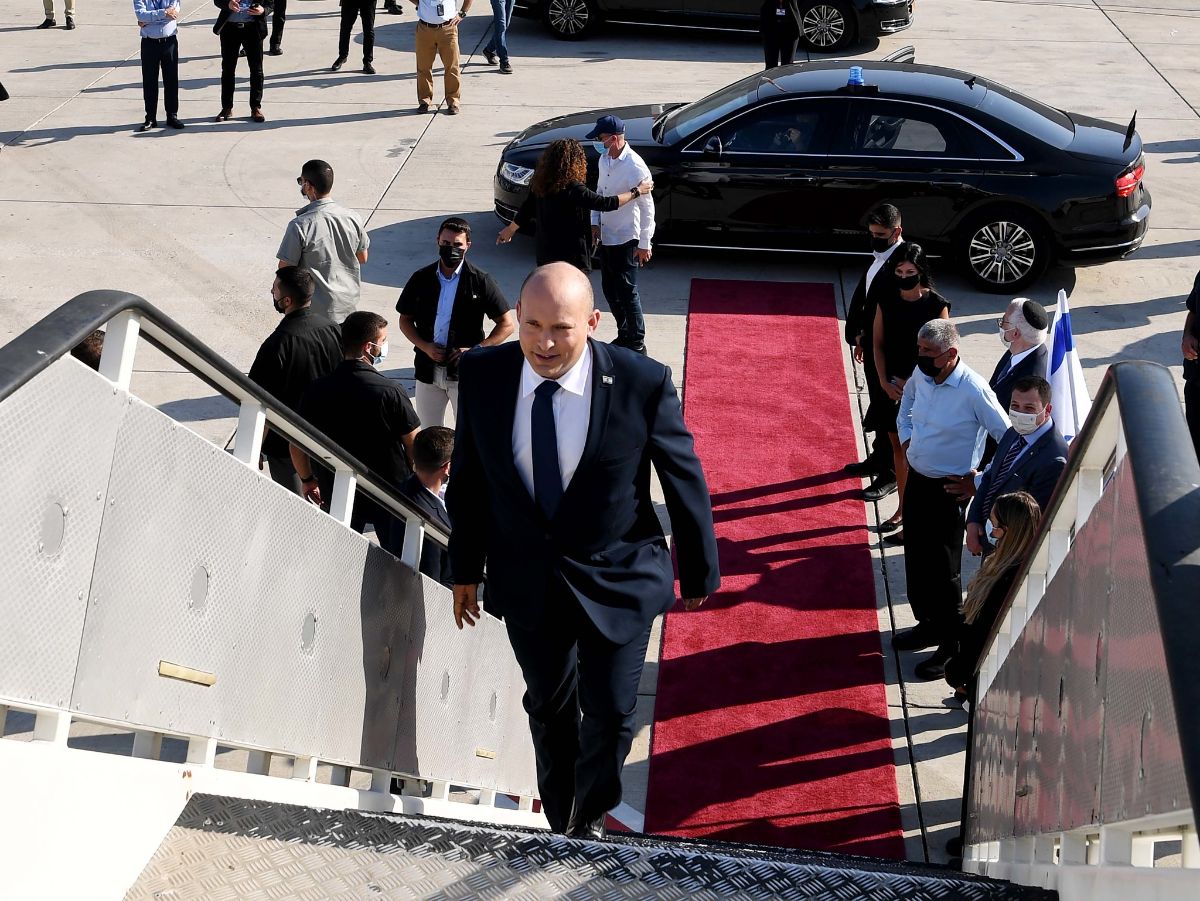Top photo: Israeli Prime Minister Naftali Bennett departed Aug. 24 for his first diplomatic visit to Washington, D.C., at the invitation of U.S. President Joe Biden. (Photo: Avi Ohayon / GPO)
Welcome to Factal Forecast, a look at the week’s biggest stories and what they mean from the editors at Factal. We publish our forward-looking note each Thursday to help you get a jump-start on the week ahead. If you like what you see, you can subscribe for free.
A look ahead:
Aug. 26/ Israeli prime minister visits White House: President Joe Biden and Israeli Prime Minister Naftali Bennett will meet on Thursday for the first time as leaders of their respective countries, aiming to reconcile differences over Iran and the Israeli occupation of Palestinian land in the West Bank.
- What’s happened so far: For more than 12 years, U.S. administrations only dealt with ex-Prime Minister Benjamin Netanyahu, a right-wing leader who lobbied for tough action against alleged threats from Iran and expanded settlements in the West Bank in violation of international law. That led to public disputes with the Obama administration that were eliminated under President Donald Trump’s leadership. Bennett, arguably further to the right than Netanyahu, is now leads a government of unlikely allies across the Israeli political spectrum, while Biden helms a left-leaning Democratic Party that’s becoming increasingly critical of Israel.
- The impact: The meeting is expected to gauge the two leaders’ ability to work together on some of the leading causes of instability in the Middle East, namely the Iran nuclear deal that the Biden administration is seeking to revive. On the conflict with Palestinians, little progress is anticipated as Israel’s own government remains divided over the so-called two-state solution and strategies to deal with militants in the Gaza Strip.
Aug. 27/ Virtual Fed conference : For the second year in a row, the Federal Reserve will meet virtually for an annual conference traditionally held in Jackson Hole, Wyo. Fed Chairman Jerome Powell will speak Friday morning in remarks that will be livestreamed to the public.
- What’s happened so far: At their last meeting in late July, Fed policymakers suggested they were looking at reducing the asset-purchase program by the end of the year. Powell mostly downplayed the risks to the economy from the current surge in coronavirus cases, saying in July, “We’ve kind of learned to live with it.” On Friday, Powell is expected to discuss how and when the bank plans to begin slowing the pace of its bond-buying program as the central bank pares the support it has been providing the economy during the pandemic.
- The impact: The Fed’s move to hold this annual conference virtually is a tacit acknowledgment of the risks of the Delta variant. That raises questions about the Fed’s view of the coronavirus’ continued impact on the economy. It will be worth watching for any shifts in language coming out of the symposium.

Aug. 28/ Planned launch of SpaceX CRS-23: SpaceX plans to use its Falcon 9 rocket and Cargo Dragon spacecraft Saturday to launch the CRS-23 resupply mission to the International Space Station.
- What’s happened so far: The launch from NASA’s Kennedy Space Center in Florida will bring several experiments to the space station, including investigations into protecting bone health and demonstrating improved dexterity of robots. It will be SpaceX’s 23rd resupply mission to the space station.
- The impact: Sponsored by the European Space Agency, the European Astronaut Centre and the German Aerospace Center’s Institute of Space Medicine, one of the experiments being ferried to the space station will test if a small device can capture images of the retinas of astronauts to document progression of vision problems that affects more than two-thirds of astronauts.

Aug. 31/ U.S. deadline to withdraw from Afghanistan: President Joe Biden remained resolute that the United States will evacuate all Americans from Afghanistan by Tuesday’s deadline, despite calls from G7 allies to extend the date to allow greater numbers of at-risk Afghans to depart the country.
- What’s happened so far: The United States has evacuated more than 83,000 people from Afghanistan since Aug. 14, including American citizens, Afghans with links to foreign forces and those seeking to escape Taliban rule. Pentagon officials said Tuesday they were confident that all Americans could be evacuated by Aug. 31, but gave few details on Afghan nationals. At a G7 meeting, U.K. Prime Minister Boris Johnson pressed for an extension to the deadline and, earlier in the day, German, Spanish and U.K. officials said evacuating all those wanting to leave by Tuesday would be nearly impossible.
- The impact: How the Taliban behaves in the final few days of the U.S. presence in Afghanistan will shape how allied forces treat any government it forms. The group said it will not entertain any extension to the deadline and is no longer allowing Afghans to travel to Kabul airport. Johnson said the G7 would not recognize a Taliban administration that does not allow Afghans to leave the country. The United Nation’s top human rights official said the Taliban’s treatment of women and girls will be a “fundamental red line,” adding she had already received credible reports of serious humanitarian violations by the group, including summary executions and recruitment of child soldiers.
Sept. 1/ Belarus tells U.S. to cut embassy staff over sanctions: Belarus has demanded the United States reduce the number of staff at its Minsk embassy to just five people by Wednesday. The demand comes after the United States imposed sanctions on Belarus following widespread results of fraud during the country’s 2020 election.
- What’s happened so far: Relations between Belarus and the West have deteriorated since the presidential election of 2020, which was marred by widespread claims of electoral fraud and the regime’s response to protests. Opposition candidates challenged results showing President Alexander Lukashenko winning a sixth term, alleging widespread abuses. The country’s electoral commission refused to invalidate the results, sparking widespread protests before a crackdown by security forces that led to more than 35,0000 arrests, thousands of beatings and the intimidation of opposition figures. Belarus has since become more of a pariah after several high-profile incidents, including the forced landing of a Ryanair flight, the defection of an Olympic athlete, and the suspicious death of an activist in Ukraine.
- The impact: The U.S. ambassador to Belarus, who was confirmed by the Senate in December, has been unable to take up her post in Minsk after authorities denied her a visa over the sanctions. With such a small team at the embassy, it’s likely consular services will be adversely affected, especially for those seeking to leave Belarus for the United States. The move is likely to deepen hostility between the two countries and push Belarus further into alignment with Russia.
Sept. 1/ Chinese data security law takes effect: Businesses that transfer key data overseas without prior approval from the Chinese government face “hefty punishments” under a new law that goes into effect Wednesday.
- What’s happened so far: In June, the Standing Committee of the National People’s Congress passed the Data Security Law, which establishes a framework for businesses to classify their data and evaluate it based on both its economic value and importance to the country’s national security. Companies found to have transferred “core data” face penalties of more than $1.5 million and could be forced to cease operations, while the transfer of “important data” could come with fines of over $750,000. Among the eight categories of data that fall under the new restrictions are science and technology, economic operations and the environment, according to a government adviser.
- The impact: Another measure, the Personal Information Protection Act, will take effect Nov. 1, and is aimed to safeguard internet user privacy. Combined, the two measures are thought to mark a significant regulatory milestone in the country.

Sept. 1/ Singapore to outlaw domestic ivory sales: On Wednesday, the Singaporean government will enact a ban on local sales of elephant ivory and ivory products.
- What’s happened so far: Singapore joins China in banning domestic ivory sales, closing the door to yet another critical end-market for the illicit ivory trade. Although the international trade of poached elephant ivory has been banned since 1989, demand for ivory products in Asian countries like China, Japan and Vietnam continues to fuel poaching of endangered elephant species across Africa. Singapore’s targeted ban will not only forbid the sale of ivory, but will also prohibit the “public display of elephant ivory and ivory products for the purpose of sale,” according to the Singaporean National Parks Board.
- The impact: Singapore’s ban on the domestic ivory trade closes a legal loophole that permits ivory that entered the market before 1990 to be sold in Singapore. Environmentalists say the loophole encourages unscrupulous ivory traders to disguise freshly poached ivory as vintage ivory, which allows traders to introduce illegally-sourced ivory to the Singaporean market.
Sept. 1/ Russia-led CTSO holds drills in Kyrgyzstan: The Russia-led Collective Security Treaty Organization [CTSO] is set to hold drills Wednesday intended to quell potential security threats from Afghanistan amid the Taliban takeover.
- What’s happened so far: The Taliban’s takeover of Afghanistan has caused concern among Russia and its Central Asian allies, despite assurances from Taliban that the situation did not threaten the countries. The CTSO serves as a military alliance between Russia and selected post-Soviet republics. Earlier this month, troops from Russia also joined Uzbekistan and Tajikistan — both members of the CTSO — in drills near the Afghanistan border. The drills in Kyrgyzstan are set to take place between Sept. 1 and Sept. 9.
The impact: The Taliban now control Afghanistan’s border with Tajikistan and Uzbekistan and with the U.S. troops set to exit Kabul by Aug. 31, Russia is looking to strengthen its security in the region. Despite assurances and a relatively moderate front by the Taliban during the takeover, Kyrgyzstan has faced terrorism threats from Afghanistan in the past.
Sept. 3/ Estimated completion date of Nord Stream 2: According to Russian President Vladimir Putin, there remain just nine miles left to complete on the Nord Stream 2 gas pipeline to Germany, meaning the controversial pipeline will likely be completed within a couple of weeks, possibly as soon as next Friday.
- What’s happened so far: Completion of the project would conclude a decade of controversy surrounding the pipeline, which was first conceived in 2011 as a way for Russian energy giant Gazprom, the project’s majority shareholder, to pump Arctic natural gas to Germany via the Baltic Sea. The United States and other European countries strongly oppose the project, saying it will increase Russia’s energy leverage over Europe. Ukraine, who has long profited from lucrative gas transit fees from Russian hydrocarbon exports to Europe, has been particularly outspoken against the pipeline.
- The impact: The Biden administration unveiled additional targeted sanctions on entities involved in the pipeline’s construction this past week, though completion of the project will continue apace. The administration’s decision can be situated within a broader desire to improve ties with Germany that were badly frayed during the Trump presidency. Moreover, one could argue that Biden has pursued a relatively less confrontational path with Russia than both Trump and Obama. Germany, for its part, called for a renewal of Ukraine’s transit agreement with Russia when it expires in 2024 and agreed to help fund green energy initiatives with Kyiv.
Sept. 3/ Venezuela talks: Venezuela’s government and opposition postponed the negotiations hosted by Mexico in mid-August to next Friday, after what both parties described as “constructive meetings.”
- What’s happened so far: A delegation of Nicolas Maduro’s government led by National Assembly president Jorge Rodriguez and the opposition coalition took the first steps to establish communications in Mexico on Aug. 13. The Norwegian Embassy in Mexico, acting as an international mediator, said the parties had reached an agreement to continue with the negotiation. While all parties involved have sent a general message of optimism, the specifics of the initial negotiations are unknown. The location of the next round of dialogue has not been confirmed.
- The impact: It’s still too early to tell whether these talks will prompt meaningful changes for Venezuela. The release of opposition figure Freddy Guevara from jail on Aug. 16 is one of the first significant concessions Maduro’s government has made. The Venezuelan leader said Guevara would be welcome to the negotiation table if appointed by the opposition. On the other side, Juan Guaido, the main leader of the opposition in the country, praised the memorandum agreement signed by both parties. Opposition politician Maria Corina Machado, leader of the Vente Venezuela party, expressed her skepticism of the negotiations, which she claims gives too many guarantees to Maduro’s side.

What else matters:
Flooding in Tennessee: At least 20 people were killed and several people remain unaccounted for after record-setting rainfall and flooding in west Tennessee on Saturday. The areas in and around the town of Waverley were hit the hardest, with hundreds of homes damaged or ruined, displacing residents across Humphreys County. Flooding and rain also took out roads, telecommunications lines, and water and power supplies for several days.
- Watch for: Officials are still assessing the full extent of the damage from Saturday’s torrential rainfall. Search efforts are ongoing for missing people, but with hope dwindling for potential survivors. The state of Tennessee received approval from President Biden to declare a major disaster, allowing for federal aid for recovery efforts.
Haiti earthquake: The humanitarian crisis stemming from this month’s magnitude 7.2 earthquake in Haiti is continuing with more than 2,200 people confirmed dead and tens of thousands of buildings damaged or destroyed. Many foreign charities, NGOs and other volunteers have sent supplies and people to the country to help first with the search and rescue and now with the recovery. The arrival of Tropical Storm Grace slowed that effort, producing 15 inches of rainfall in some places, causing floods and mudslides.
- Watch for: The natural disaster came just weeks after the assassination of President Jovenel Moïse. The caretaker government’s slow response has led many villagers to go it alone and begin rebuilding themselves. Many politicians are also using this as an opportunity to raise their status by handing out cash and food. If anti-government feelings continue, it could lead to unrest and upheaval for the country that’s still reeling.
Extended outlook: What’s on our radar in the coming weeks
Aug. 26: Biden meets with Israeli PM at White House
Aug. 27: Fed meeting goes virtual due to Delta variant
Aug. 28: Planned launch of SpaceX CRS-2
Aug. 31: Deadline for U.S. troops to leave Afghanistan
Sept. 1: Singapore to ban domestic elephant ivory trade; Russia-led security bloc to hold drills in Kyrgyzstan; China’s personal data privacy law takes effect; Belarus tells U.S. to cut embassy staff in row over sanctions
Sept. 3: New round of Venezuela talks; estimated completion date of Nord Stream 2
Sept. 5: Hong Kong legislative election
Sept. 10: First game of 2021 NFL season
Sept. 11: 20th anniversary of September 11 attacks
Sept. 12: Pope Francis visits Budapest, Hungary
Sept. 13: Norway parliamentary election
Sept. 14: California gubernatorial recall election; Boston mayoral primary
Sept. 19: 73rd Primetime Emmy Awards; Russian legislative elections
Sept. 20: Canada snap election; U.S. to begin offering third coronavirus vaccine shots
Sept. 21: 76th UN General Assembly
Sept. 25: Icelandic parliamentary elections
Sept. 26: Haitian elections; German federal elections

